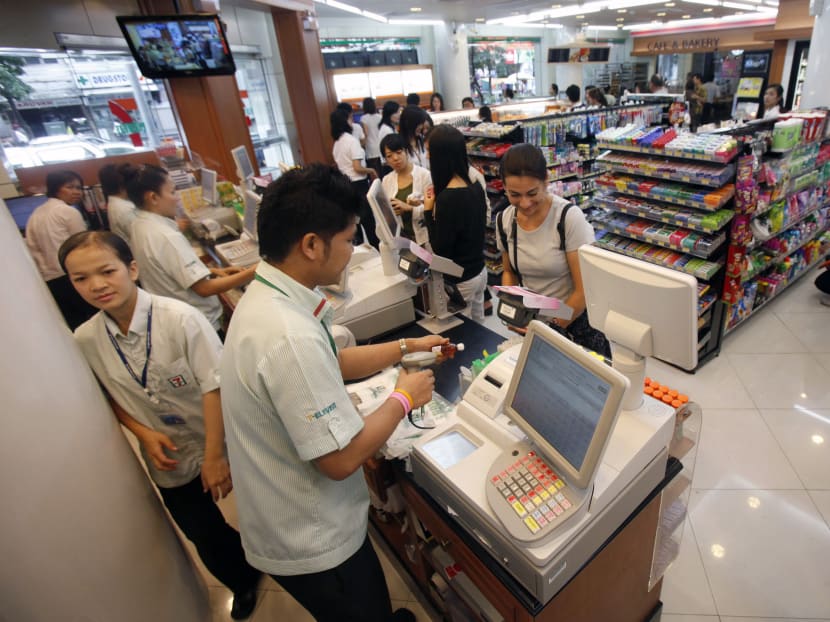Thai 7-Eleven stores to adopt facial-recognition technology
BANGKOK — Thailand’s biggest convenience store chain, 7-Eleven, is to roll out state-of-the-art artificial intelligence technologies, including facial and gesture recognition and behaviour analysis of customers and employees, at the chain’s 11,000 stores.

Customers buy goods at a 7-Eleven store in Bangkok. The convenience store chain is set to roll out state-of-the-art artificial intelligence technologies, including facial and gesture recognition and behaviour analysis of customers and employees. Photo: Reuters
BANGKOK — Thailand’s biggest convenience store chain, 7-Eleven, is to roll out state-of-the-art artificial intelligence technologies, including facial and gesture recognition and behaviour analysis of customers and employees, at the chain’s 11,000 stores.
The ubiquitous retailer, whose Thai stores are operated by a unit of the Bangkok-based conglomerate Charoen Pokphand (CP), is to work with Remark Holdings, a Nasdaq-listed AI company with operations in China and the United States.
Remark will deploy its KanKan technology, which uses gesture recognition to collect and analyse data points on traffic in stores, staff activities, how long customers linger at specific shelves and even their emotions as they pass through stores.
It can identify members of 7-Eleven’s loyalty programme, allowing managers to single them out for promotions.
A “machine learning” element can predict, for example, which products should or should not be stocked at individual stores.
CP Group chairman Soopakij Chearavanont said the technology would help the chain drive revenues, cuts costs and improve margins.
He also said he planned to introduce KanKan to Ping An Insurance, the Chinese underwriting giant, in which CP is the biggest shareholder.
“Artificial intelligence has the power to completely transform business in every industry,” Mr Kai-Shing Tao, Remark’s chief executive, told the Financial Times. “CP Group recognised this right away and is making it a very high priority to adopt and implement AI technologies.”
Unlike in the US, where the brand is best known for its soft drinks, Thai 7-Elevens are one-stop shops that also offer banking services such as bill payment.
According to Remark and CP All, the CP unit that runs 7-Eleven stores, about 10 million people pass through the chain’s stores in Thailand every day.
The deployment will underscore Asia’s status as a laboratory for AI technologies.
Yum China, owner of the KFC fast-food brand in China, last year announced it was piloting a facial-recognition payment system at a store in Hangzhou.
7-Eleven, which is owned by Japan’s Seven & I Holdings, is also introducing facial recognition technologies at some of its stores in Japan and Taiwan.
Advanced AI systems promise to offer retailers new tools to better understand customers, improve staff efficiency and avoid waste and spoilage.
Ping An is already using facial recognition, and in 2016 announced the launch of a “face recognition loan”. Ant Financial, Alibaba’s payments unit, lets its 450 million users log in to their online wallets by taking a selfie, while China Construction Bank uses facial recognition at its vending machines.
However, civil liberties groups have warned of the dangers if data generated in shops is shared with other parties, such as insurers, credit agencies or state security services.
“For customers, it’s just another example of how our offline, real-world activities are turning into online ones, where everything is being recorded to create ever more detailed and sensitive profiles,” said Mr Edin Omanovic of Privacy International, a UK-based watchdog group.
Remark said that no images of human faces would be stored on servers or permanent storage, adding that its technology used only facial features — not whole faces — to generate data, which are encrypted and hashed.
The company also said that IDs based on facial recognition would not be linked to information such as names, phone numbers or addresses.
“No human faces or images ever leaves the KanKan system or goes on the public network,” the company said.
In Japan, 7-Eleven recently said it would impose strict limits on access to personal information held in its stores, in response to a revised personal information law. FINANCIAL TIMES









